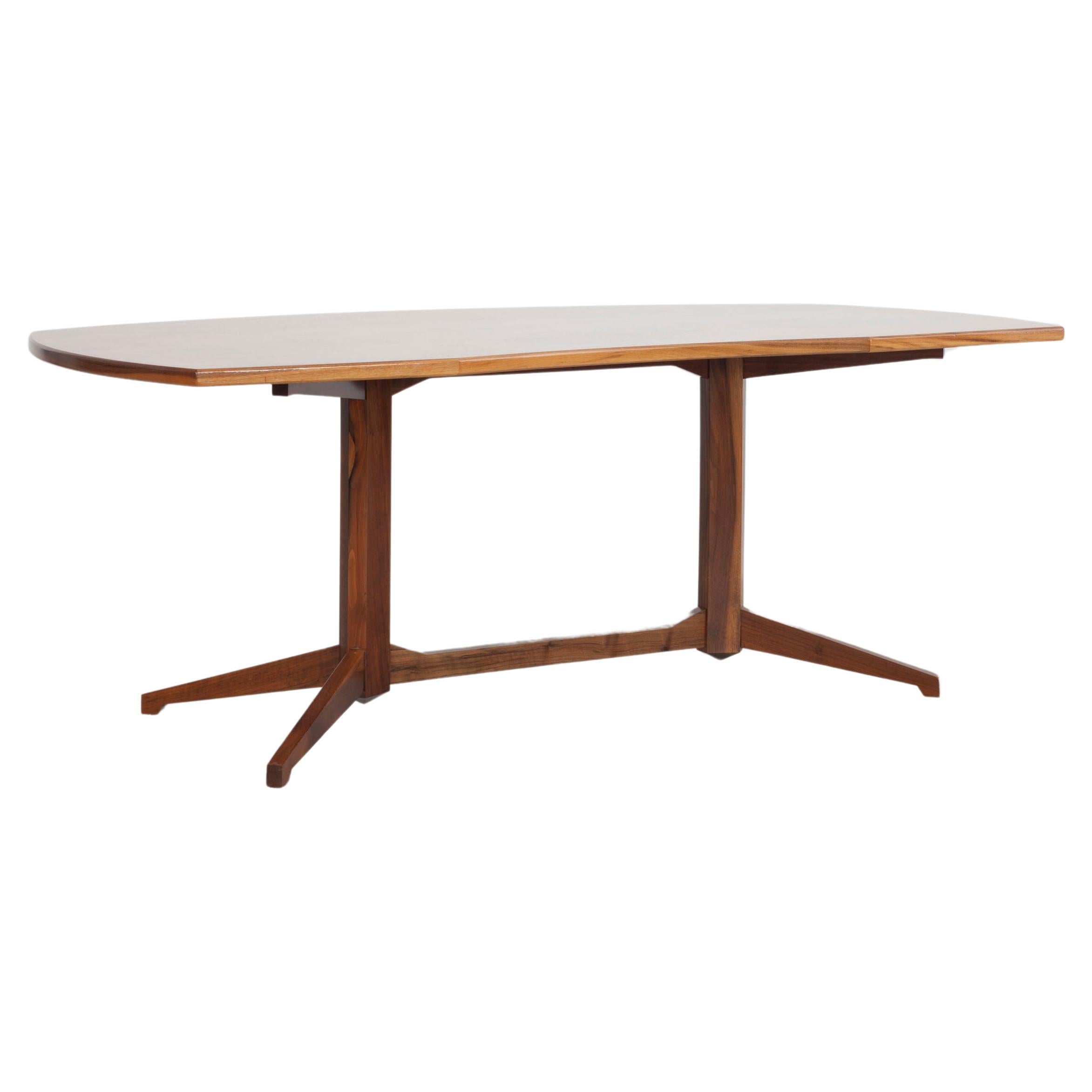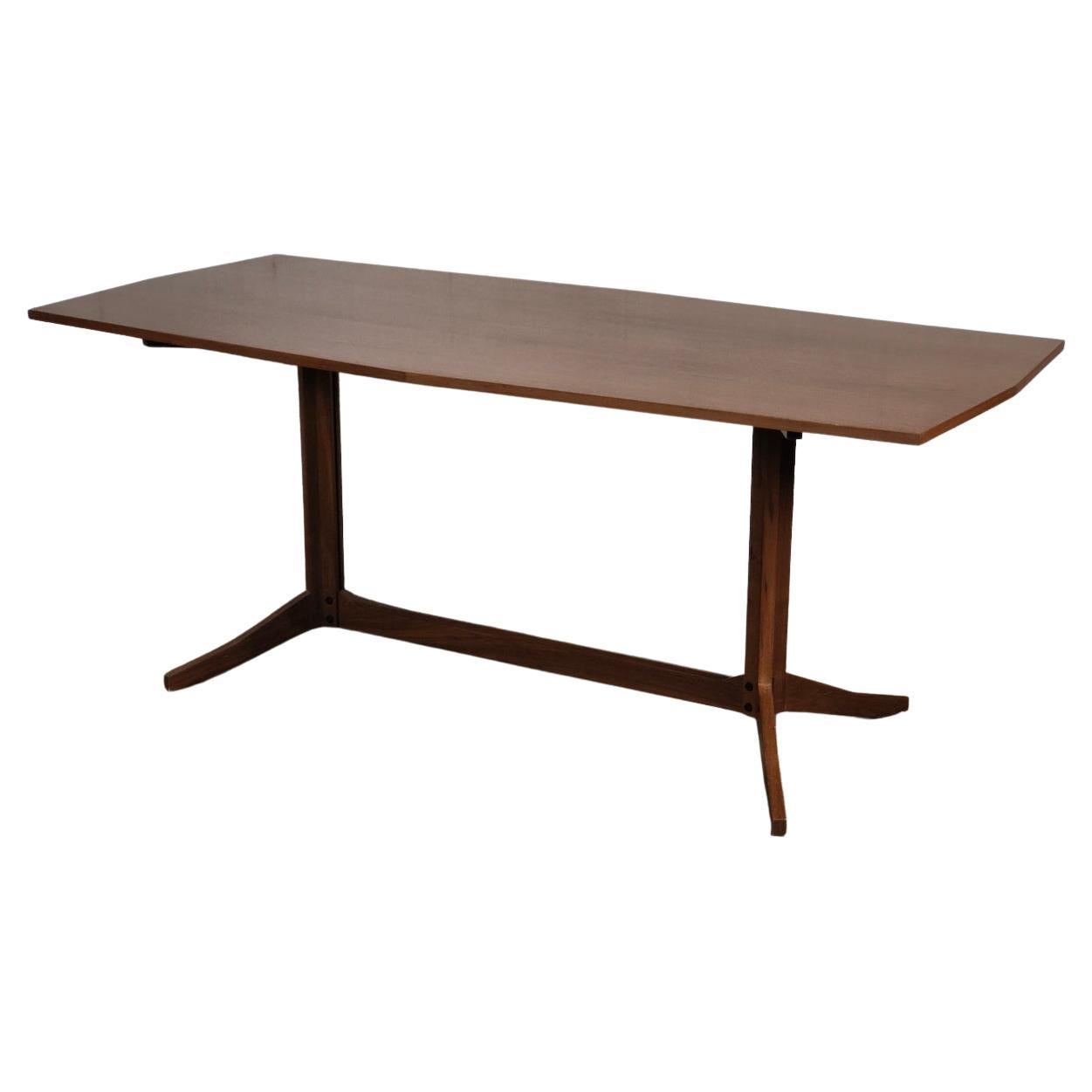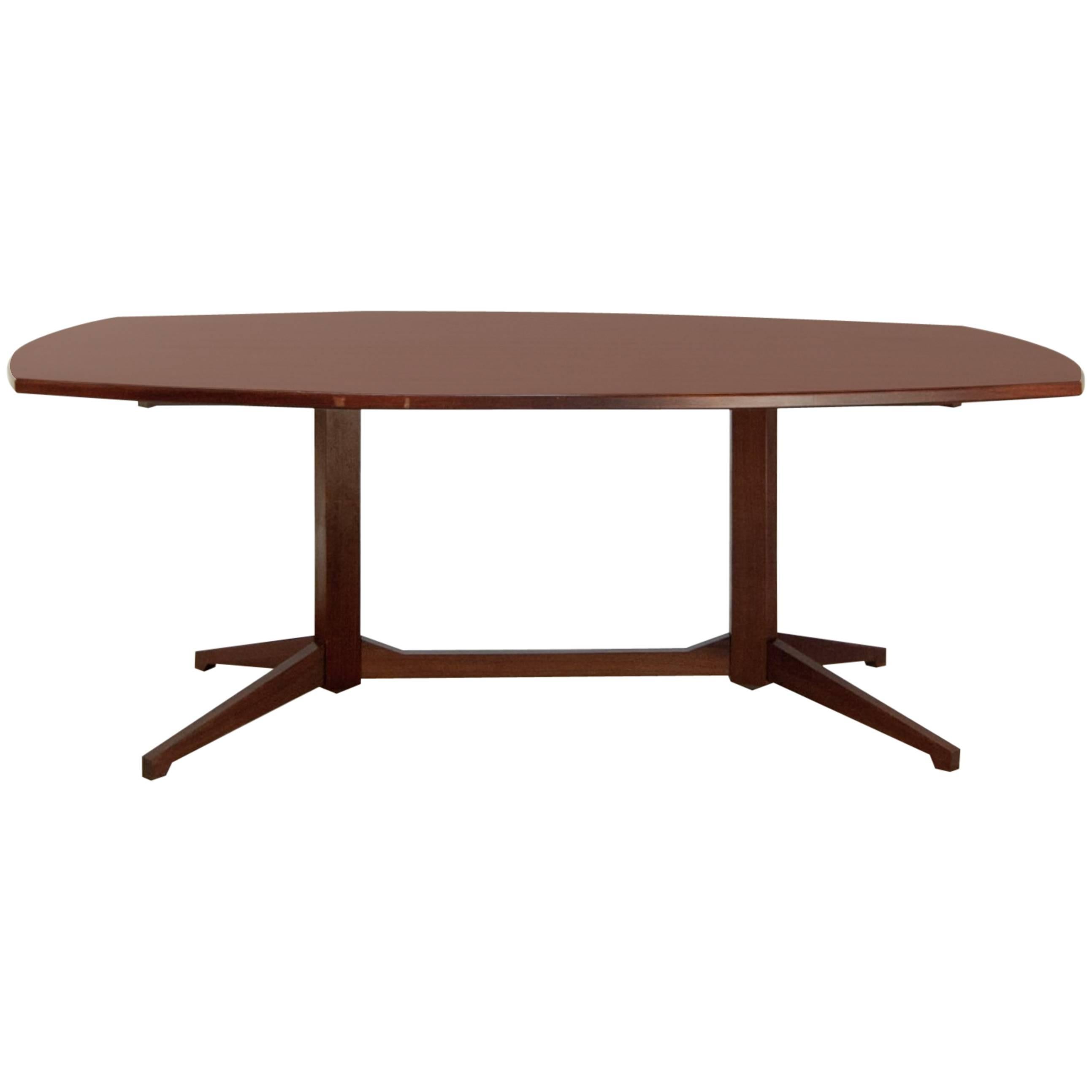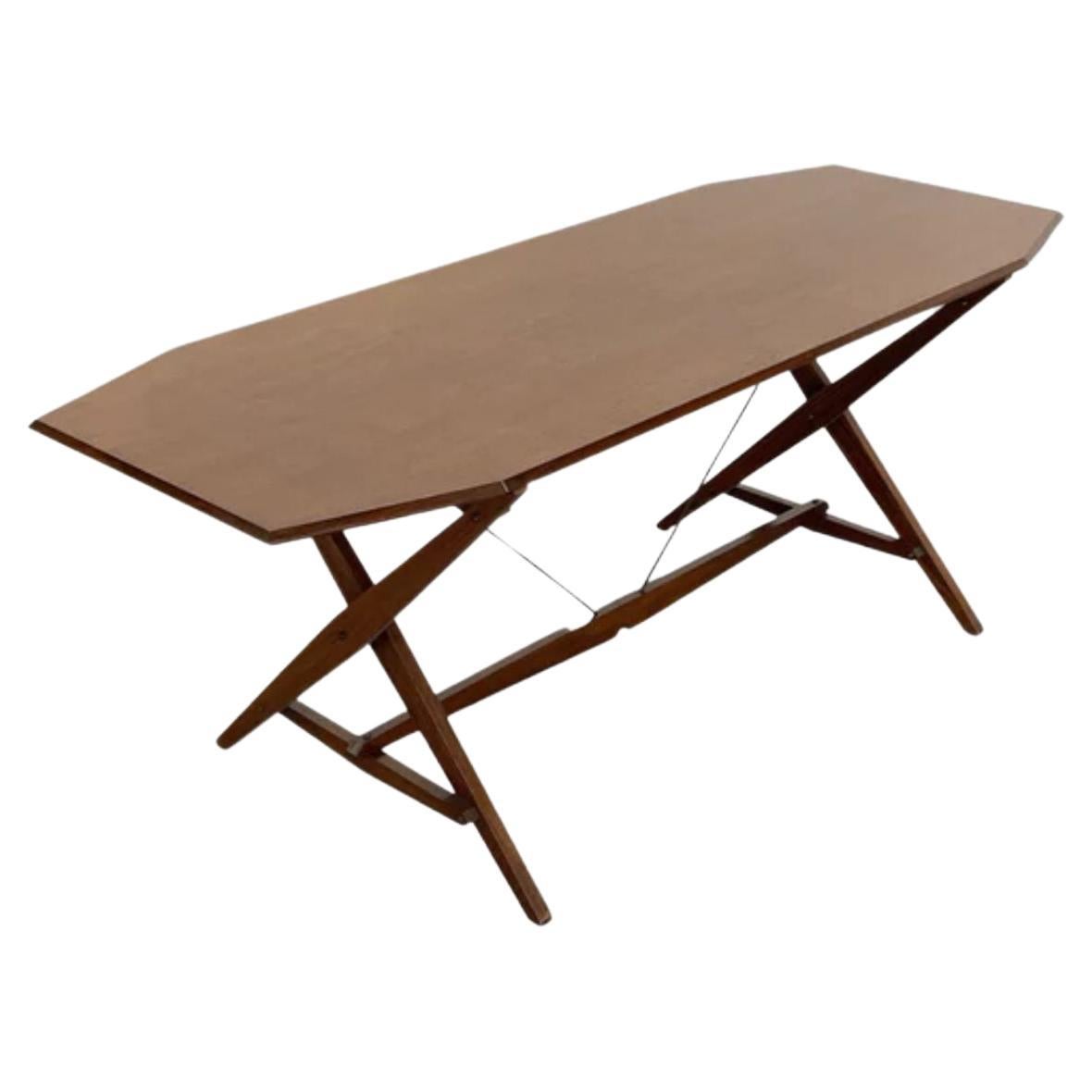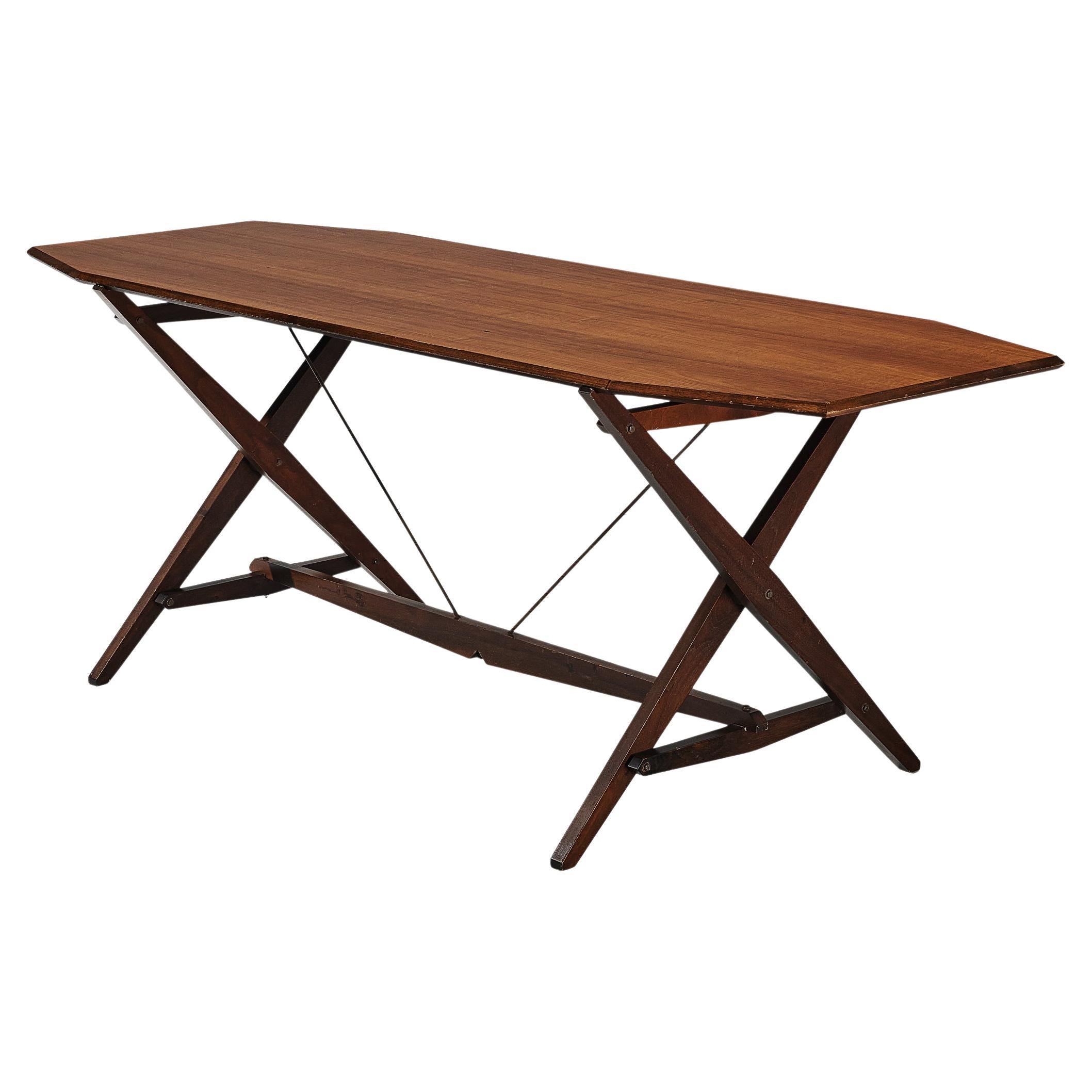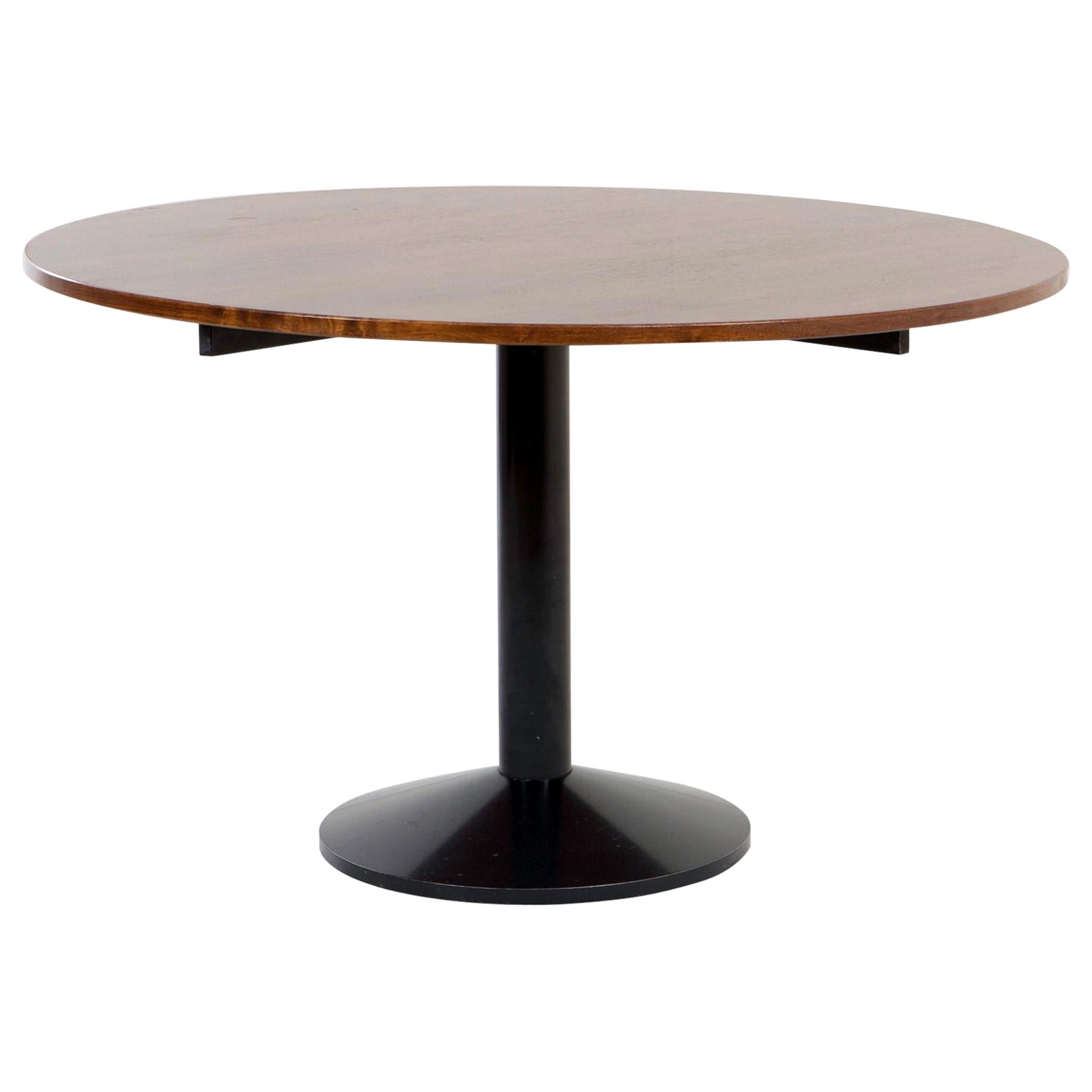Items Similar to Dining Table, Model TL22, in Mahogany by Albini & Helg for Poggi, Italy 1958
Video Loading
Want more images or videos?
Request additional images or videos from the seller
1 of 10
Dining Table, Model TL22, in Mahogany by Albini & Helg for Poggi, Italy 1958
About the Item
Beautiful model 'TL22' dining table by Franco Albini and Franca Helg for Poggi, from 1958. The architects Albini and Helg worked together on a large number of projects from 1951 until Albini's death in 1977. Both in architecture and furniture design. This TL22 table is an early result of this successful collaboration and was at the time manufactured by the famous Italian label Poggi. The base is very striking and ingeniously designed by the duo and immediately betrays their sense of style and harmony, which is expressed through engineering techniques. Its four legs ensure that the table gets lifted from the floor. This subsequently gives space to provide the two upright legs with a special detail at the bottom. We see two hexagonal pyramids pointing downwards and these are beautifully made out of shiny mahogany wood. The crossbar that connects the two hexagonal legs is fixed on the ends with a black Allen bolt. These connections all fit together in a refined way and the bolts are all countersunk. The construction directly under the top is about the same as at the foot but is less visible. That is also the reason that the attention has gone to the lower part of the frame through those hexagonal shapes. The top has a beautiful boat shape and is accompanied and enhanced in its appearance by the quality and luxurious appearance of mahogany wood. This very impressive and stylish table has been fully restored and is therefore in very good condition.
- Creator:Franco Albini and Franca Helg (Designer),Pozzi (Manufacturer)
- Dimensions:Height: 28.75 in (73 cm)Width: 70.87 in (180 cm)Depth: 40.95 in (104 cm)
- Style:Mid-Century Modern (Of the Period)
- Materials and Techniques:
- Place of Origin:
- Period:
- Date of Manufacture:1958
- Condition:Refinished.
- Seller Location:Hellouw, NL
- Reference Number:1stDibs: LU5583233785832
About the Seller
5.0
Platinum Seller
These expertly vetted sellers are 1stDibs' most experienced sellers and are rated highest by our customers.
Established in 2019
1stDibs seller since 2021
125 sales on 1stDibs
Typical response time: 1 hour
- ShippingRetrieving quote...Ships From: Haaften, Netherlands
- Return PolicyA return for this item may be initiated within 14 days of delivery.
More From This SellerView All
- Serving Trolley Model CR20 In Mahogany By Franco Albini for Poggi, Italy 1958By Poggi, Franco Albini, Franca HelgLocated in Hellouw, NLFranco Albini was a significant figure in modern Italian design of the twentieth century. His creations are characterized by an aesthetic that can best be described as elegant minima...Category
Vintage 1950s Italian Mid-Century Modern Serving Tables
MaterialsMahogany
- Dining Table in Mahogany, Rosewood and Brushed Brass, Italy, 1960sLocated in Hellouw, NLThis Italian dining table from the 1960s stands out for its architectural design and choice of materials. Let's start with the frame that is characterized by a number of striking det...Category
Vintage 1960s Italian Mid-Century Modern Dining Room Tables
MaterialsBrass
- Dining Table by Ico Parisi for Brugnoli Mobili Cantù, Italy, 1950sBy Ico Parisi, Brugnoli Mobili CantúLocated in Hellouw, NLImpressive dining table iby Ico Parisi for Brugnoli Mobili Cantù from Italy, the 1950s. This table has a base with well-designed legs that featur...Category
Vintage 1950s Italian Mid-Century Modern Dining Room Tables
MaterialsWood, Walnut
- Sandro Petti Dining Table for Angolometallarte, Italy, 1970sBy Sandro Petti, AngolometallarteLocated in Hellouw, NLThis Sandro Petti dining table for Angolometallarte from Italy the 1970s is one of our favorite items. We love the combination of the black chromed metal, brass feet, and glass top. ...Category
Vintage 1970s Italian Mid-Century Modern Dining Room Tables
MaterialsBrass, Chrome
- Carlo Scarpa 'Samo' Dining Table for Simon Gavina, Italy, 1970sBy Carlo Scarpa, Simon Gavina EditionsLocated in Hellouw, NLThis Italian dining table from the 1970s exudes timeless elegance and beauty. It was designed by perhaps one of the prominent Italian modernist designers of the last century. What im...Category
Vintage 1970s Italian Mid-Century Modern Dining Room Tables
MaterialsGranite
- Gio Ponti Dining Table in Veneered Walnut, Italy 1940sBy Gio PontiLocated in Hellouw, NLAmazing dining table by Gio Ponti from the early 1940s, Italy. It has a rectangular top in veneered Italian walnut with underneath four tapered fluted legs. A similar striking fluted...Category
Vintage 1940s Italian Mid-Century Modern Dining Room Tables
MaterialsWood, Walnut
You May Also Like
- Desk Model TL22, by Franco Albini and Franca Helg. Poggi, 1958By Amando Poggi, Franco Albini and Franca HelgLocated in Wolfurt, ATDesk model TL22, designed by Franco Albini and Franca Helg and manufactured by Poggi in 1958. Table completely restored. Wood: walnut. Letteratura: Gramigna G., Repertorio del desig...Category
Vintage 1950s Italian Mid-Century Modern Desks and Writing Tables
MaterialsWalnut
- Wooden Dining Table TL22 Model by Franco Albini for Poggi 60sBy Poggi, Franco AlbiniLocated in Padova, ITWooden dining table TL22 model by Franco Albini for Poggi 60s. Born in Milan in 1905, Franco Albini is an Italian architect, urban planner and furniture designer, active between the 1930s and 1960s. He studied at the Milan Polytechnic and completed his apprenticeship under the guidance of the architect and designer Gio Ponti, and played a key role in the formulation of the Italian Rationalist movement in the years before the Second World War. Albini works with several well-known mid-century manufacturers, among which Cassina, Arflex, Poggi, Arteluce, Brionvega, and Knoll stand out, and many of his designs are still in production today. He has received many honors for his work, including three Compasso d'Oro. The professional story of the furniture maker Roberto Poggi...Category
Vintage 1960s Italian Mid-Century Modern Dining Room Tables
MaterialsWood
- Franco Albini Mahogany mid-centry Italian Table Model TL-22 produced by PoggiBy Franco AlbiniLocated in Barcelona, ESFranco Albini & Franca Helg. Dining table model no. TL22. Manufactured by Poggi, Italy, 1958. Mahogany. Measurements: 180.3 cm x 104.1 cm x 73 H cm. 70.98 in x 40.98 in x 28.74 in. Literature: Giuliana Gramigna, Repertorio 1950/1980, Milan, 1985, p. 123. Franco Albini, was born in 1905 and died in 1977. He spent his childhood and part of his youth in Robbiate in Brianza, where he was born. Albini, as an adolescent moved with his family to Milan. Here he enrolled in the Faculty of Architecture of the Polytechnic and graduated in 1929. He started his professional activity in the studio of Gio Ponti and Emilio Lancia, with whom he collaborated for three years. At the 1929 International Exhibition in Barcelona (where Gio Ponti curated the Italian pavilion and Mies van der Rohe realized that of Germany) and in Paris where, as Franca Helg recounted, he had the opportunity to visit the studio by Le Corbusier. In those three years, the works he carried out are admittedly of the twentieth century imprint. It is the meeting with Edoardo Persico that marked a clear turning point towards rationalism and the approach to the group of editors of "Casabella". The partly ironic and partly very harsh comments of the Neapolitan critic to a series of drawings, made by Albini for the design of some office furniture, caused him a great disturbance. “I spent days of real anguish - Albini recalls - I had to answer all the questions. I also had a fever, a large and long fever. " The meted provoked Albini to openen a professional studio in via Panizza with Renato Camus and Giancarlo Palanti. The group of architects began to deal with public housing by participating in the competition for the Baracca district in San Siro in 1932 and then building the IFACP neighborhoods: Fabio Filzi (1936/38), Gabriele D'Annunzio and Ettore Ponti (1939). During this period, Albini also worked on his first villa (Pestarini), which Giuseppe Pagano, architect and critic of the time, presented as follows: “This coherence, which the superficial rhetoric of fashionable jugglers calls intransigence, and which is instead the basis of understood between the fantasy of art and the reality of the craft, in Franco Albini, it is so rooted that it transforms theory into a moral attitude ". But it is above all in the context of the exhibitions that the Milanese master experienced his compromise between that "rigor and poetic fantasy" of which Pagano speaks, coining the elements that became a recurring theme in his . The opening in 1933 of the new Triennale headquarters in Milan, in the Palazzo dell'Arte, was an important opportunity to express the strong innovative character of rationalist thinking, a gym in which to freely experiment with new materials and new solutions, but above all a "method". "Cultivated as a communication laboratory, the art of setting up was for the rationalists of the first generation what the perspective had been for the architects of humanism: the field open to a hypothesis of space that needed profound reflections before landing the concreteness of the construction site ". Together with Giancarlo Palanti, Albini on the occasion of the V Triennale di Milano set up the steel structure house (with R. Camus, G. Mazzoleni, G. Minoletti and with the coordination of G. Pagano), for which he also designed the 'furniture. At the following Triennale of 1936, Persico dided, together with a group of young designers gathered by Pagano in the previous edition of 1933, Franco Albini took care of the preparations of the home exhibition. The setting up of Stanza per un uomo, at that same Triennale, allows us to understand the acute and ironic approach of Albini, as a man and as a designer: "Celebrating the beauty of mechanics was the imperative to which, for example, the surprising displays by Franco Albini who managed, in the subtle way of a refined and rarefied style, to sublimate their practical content in the metaphysics of daring still lifes: flying objects which marked in the void refined frames and metal intricacies the nodes of a fantastic cartography where industry finally became art free from purpose ". That same year Albini and Romano designed the exhibition of the Ancient Italian Goldsmithery: vertical uprights, simple linear rods, designed the space. A theme, of the "flagpole", seemed to be the center of the evolution of production and the creative process. The concept is reworked over time, with the technique of decomposition and recomposition typical of Albinian design: in the preparation of the Scipione Exhibition and contemporary drawings (1941) the tapered flagpoles, on which the paintings and display cases were hung, are supported by a grid of steel cables; in the Vanzetti stand (1942) they take the V-shape; in the Olivetti shop in Paris (1956) the polished mahogany uprights support the shelves for the display of typewriters and calculators. The flagpole is found, however, also in other areas. In the apartments he designed, it is used as a pivot on which the paintings can be suspended and rotated to allow different points of view, but at the same time as an element capable of dividing the spaces. The Veliero bookcase...Category
Mid-20th Century Italian Mid-Century Modern Dining Room Tables
MaterialsMahogany
- Model Tl2 Desk / Dining Table by Franco Albini for Poggi, Italy, 1951By Poggi, Franco AlbiniLocated in Skokie, ILFranco Albini model TL2 desk or dining table for Poggi, Italy, 1950s Franco Albini for Poggi, dining table model TL2, walnut and metal, Italy, 1951. The TL2 table by Franco Alb...Category
20th Century Italian Mid-Century Modern Dining Room Tables
MaterialsPalisander
- Franco Albini for Poggi Dining Table in WalnutBy Poggi, Franco AlbiniLocated in Waalwijk, NLFranco Albini for Poggi, dining table, model TL2, walnut and iron, Italy, 1951. The TL2 table by Franco Albini features a simplistic and sleek design. Executed in darkened walnut wo...Category
Vintage 1950s Italian Mid-Century Modern Dining Room Tables
MaterialsIron
- Franco Albini TL30 Round Table in Metal and Wood for Poggi Pavia 1950s ItalyBy Poggi, Franco AlbiniLocated in Montecatini Terme, ITRound table model TL30 with black lacquered metal base and a wooden top. Designed by Franco Albini for Poggi, Pavia in 1950s. After spending his childhood and part of his youth in Robbiate in Brianza, where he was born in 1905, Franco Albini moved with his family to Milan. Here he enrolled in the Faculty of Architecture of the Polytechnic and graduated in 1929. He starts his professional activity in the studio of Gio Ponti and Emilio Lancia, with whom he collaborates for three years. He probably had his first international contacts here In those three years, the works carried out are admittedly of a twentieth-century imprint. It was the meeting with Edoardo Persico that marked a clear turning point towards rationalism and the rapprochement with the group of editors of “Casabella”. The new phase that that meeting provoked starts with the opening of the first professional studio in via Panizza with Renato Camus and Giancarlo Palanti. The group of architects began to deal with public housing by participating in the competition for the Baracca neighborhood in San Siro in 1932 and then creating the Ifacp neighborhoods: Fabio Filzi (1936/38), Gabriele D’Annunzio and Ettore Ponti (1939). Also in those years Albini worked on his first villa Pestarini. But it is above all in the context of the exhibitions that the Milanese master experiments his compromise between that “rigor and poetic fantasy” coining the elements that will be a recurring theme in all the declinations of his work – architecture, interiors, design pieces . The opening in 1933 of the new headquarters of the Triennale in Milan, in the Palazzo dell’Arte, becomes an important opportunity to express the strong innovative character of rationalist thought, a gym in which to freely experiment with new materials and new solutions, but above all a “method”. Together with Giancarlo Palanti, Albini on the occasion of the V Triennale di Milano sets up the steel structure house, for which he also designs the ‘furniture. At the subsequent Triennale of 1936, marked by the untimely death of Persico, together with a group of young designers gathered by Pagano in the previous edition of 1933, Franco Albini takes care of the preparation of the exhibition of the house, in which the furniture of three types of accommodation. The staging of Stanza per un uomo, at that same Triennale, allows us to understand the acute and ironic approach that is part of Albini, as a man and as a designer: the theme addressed is that of the existenzminimum and the reference of the project is to the fascist myth of the athletic and sporty man, but it is also a way to reflect on low-cost housing, the reduction of surfaces to a minimum and respect for the way of living. In that same year Albini and Romano designed the Ancient Italian Goldsmith’s Exhibition: vertical uprights, simple linear rods, design the space. A theme, that of the “flagpole”, which seems to be the center of the evolution of his production and creative process. The concept is reworked over time, with the technique of decomposition and recomposition typical of Albinian planning: in the setting up of the Scipio Exhibition and of contemporary drawings (1941) the tapered flagpoles, on which the paintings and display cases are hung, are supported by a grid of steel cables; in the Vanzetti stand (1942) they take on the V shape; in the Olivetti store in Paris (1956) the uprights in polished mahogany support the shelves for displaying typewriters and calculators. The reflection on this theme arises from the desire to interpret the architectural space, to read it through the use of a grid, to introduce the third dimension, the vertical one, while maintaining a sense of lightness and transparency. The flagpole is found, however, also in areas other than the exhibition ones. In the apartments he designed, it is used as a pivot on which the paintings can be suspended and rotated to allow different points of view, but at the same time as an element capable of dividing spaces. The Veliero bookcase...Category
Vintage 1950s Italian Mid-Century Modern Dining Room Tables
MaterialsMetal
Recently Viewed
View AllMore Ways To Browse
Shiny Black Made In Italy
Dining Table Boat
Hexagon Dining Tables
Architects Table Mahogany
Poggi Italy
Hexagonal Tables Italian
Two Foot End Table
Pyramid Base Table
Black Franco Albini
Bottom Of The Boat
Hexagon End Table Vintage
Boat Top Table
Lift Top End Table
Mid Century Modern Lift Top Table
Hexagonal Tables
Black Shiny Dining Table
Franco Albini For Poggi
Mid Century Modern Hexagon Dining Table
